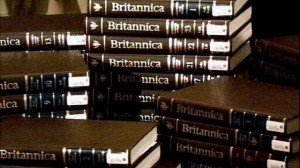Britannica has one T…Britannica has one T…Britannica has one T… and two Ns. >sigh< Yes, I am dyslexic. Really.
 Last week’s announcement that Encyclopedia Britannica would cease publication of its paper edition inspired a number of eulogies from book lovers. The cessation of their production affirms to many bibliophiles that the family bookshelf as an accoutrement to every home could become a thing of the past.
Last week’s announcement that Encyclopedia Britannica would cease publication of its paper edition inspired a number of eulogies from book lovers. The cessation of their production affirms to many bibliophiles that the family bookshelf as an accoutrement to every home could become a thing of the past.
The earliest known encyclopedia in the West was written by Pliny the elder and published a little north of two thousand years ago. Naturalis Historia read more like a linear narrative than what we think of as an encyclopedia. The ordered, journalistic entries of information would develop sometime around the eighteenth century. They were originally intended by some publishers to be companion volumes to dictionaries. Many of the earliest versions were contained in a single book. As publishing technology evolved, the production of encyclopedias often employed materials and technologies that made them not only the most information-rich texts in a collection, but the most materially luxurious as well.
By the 1920s’, the price tag of multi-volume sets were slightly more affordable but still out of reach for most families, thus putting them in the category of luxury items for the relatively wealthy and academics who could take advantage of educators’ discounts. School children learned to love or loathe being sent to the reference section of their institution’s libraries to ferret out information on earthworms or Abraham Lincoln or the primary industries of Saskatchewan. Those volumes, primly shelved in their correct sequence, often bound in sedate blacks and maroons and hunter greens, belied the happy intellectual journeys they contained. Flags would lead to a surprisingly interesting entry on flies and then the colourful section on Florida would bring on a need to look up alligators and pirates and the Seminole People.
The post World War II economic boom created a new category of consumers who had more disposable income and a desire to acquire goods that their parents would have never considered owning. The fifties and sixties were marked by a number of industries taking their marketing from the showroom and office to the expanding suburbs. Encyclopedia salesmen canvassed neighbourhoods, carrying sample volumes and touting their brand of books as the key to every child’s academic success. All it took was for Mom and Dad to sign on the dotted line and a few weeks later either a large box containing all of the books -or the first installment of them- would arrive, sometimes with a complimentary shelf to hold them all.
As the industry grew, marketing expanded to reach a wider diversity of consumers. Britannica was one of a few imprints that inhabited the high end of the encyclopedia trade. In the middling range were Colliers, Comptons, World Book and Encyclopedia Americana. The leaner times that marked the latter half of the last century brought about the introduction of less expensive sets, often sold in installments at grocery stores. Some of these sets were comprised of content that was no longer under copyright protection. Others were stripped down versions of the more expensive editions.
Just as video surely killed the radio star (and reality TV killed any hope of finding five contiguous minutes of music on MTV); the internet dealt the fatal parry and thrust to the concept of the encyclopedia as the final authority on anything. Information that could be years old was replaced by the lightning fast transmission of facts about a given subject via online news outlets, the redoubtable Wikipedia and subscription-based access to Britannica. The ability to keep information up to date has been a boon for scholars and researchers.
The yin to the internet’s yang of currency is attention to accuracy and the particular literary voice that made some of these resources so distinctive. Seeking out an obscure point of data can still lead to some interesting trips down intellectual rabbit holes. It can also lead to a frustrating echo chamber where a piece of information can be transmitted from one source to another and the researcher ends up on a moebius loop of citations circling back on themselves without offering any further insight into the subject.
The obsolescence of the encyclopedia as a static source of information means the loss of words and images that can be revisited again and again as one matures. It is a sign that our relationship with books is changing. Paper is getting dearer, money is short for many and the digital publishing revolution answers the need for content without further taxing either limited resource. For book lovers of a certain age, the death of the paper encyclopedia creates a shelf-shaped hole in their notion of what a household library should contain. The idea that another generation may not carry memories of happy hours spent wandering from article to article, paging past pictures and phrases that will stay burned into memory decades later is a little sad. Then again, monks and clerics probably mourned the loss of lovely, hand-lettered tomes when that punk Gutenberg started cranking out pages at a rate that must have seemed like magic at the time.
